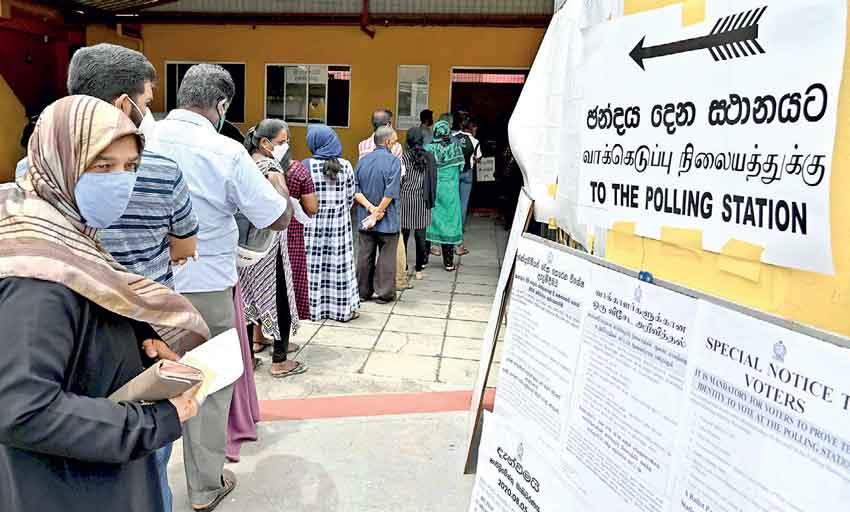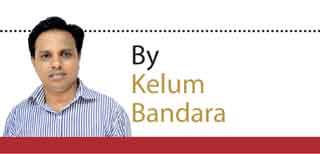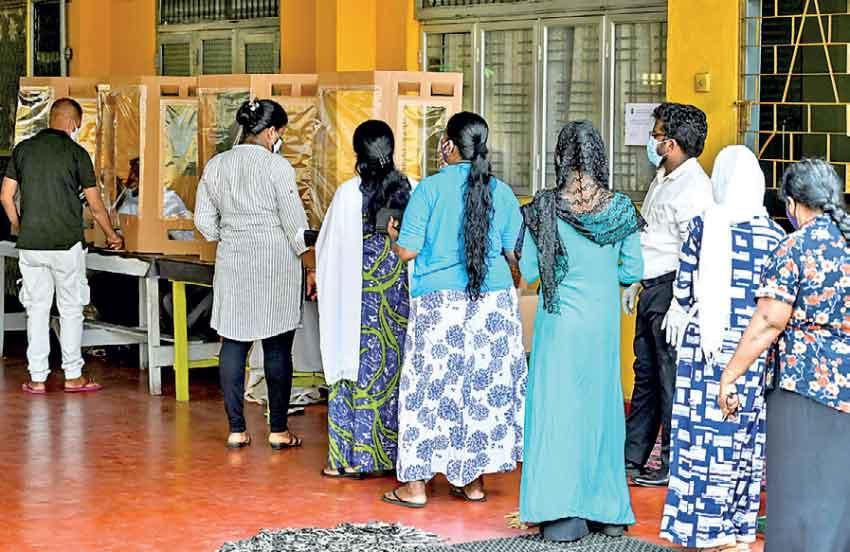Reply To:
Name - Reply Comment

If the present regime conducts and wins the much talked about elections to the provincial councils it can blunt criticism emanating from the opposition
For the SLPP or the Government for that matter, provincial council elections hold political significance at this juncture
The opposition parties are trying to cash in on the situation for their electoral advantage in the future; a phenomenon natural under a democratic set-up
Already, there are politicians, including the relatives of the Cabinet Ministers, waiting in the wings to be appointed to serve as chief ministers and provincial ministers
 The leaders of the political parties which are aligned with the government resolved on Tuesday evening to have elections to the provincial councils at the earliest. Conflicting thoughts exist among people and the parties on the viability of the provincial councils which remain defunct; some of them since 2017. Some of the forces that back the Government have also upped the ante against the provincial councils system calling it a white elephant.
The leaders of the political parties which are aligned with the government resolved on Tuesday evening to have elections to the provincial councils at the earliest. Conflicting thoughts exist among people and the parties on the viability of the provincial councils which remain defunct; some of them since 2017. Some of the forces that back the Government have also upped the ante against the provincial councils system calling it a white elephant.
However, Sri Lanka Podujana Peramuna (SLPP), the leading party of the Government, is all for it. SLPP leader Prime Minister Mahinda Rajapaksa is in favour of early elections, and the minor allies of the ruling side have fallen in line with it despite differences of opinions.
For the SLPP or the Government for that matter, such elections hold political significance at this juncture. The Government has seen its popularity either on the wane or jolted over various reasons. One is due to the failure on the part of the Government to perform to the extent people expected. It has triggered fears in the minds of the people, particularly those who voted it in, whether the Government has deviated from the task assigned to it by constituents. Of course, the pandemic stood in the way of the Government when delivering. But, people do not pardon the Government for what they perceived as lack of direction, deviation from the expected role, and no coordination of its work in certain aspects. Criticism has swelled against the Government over matters such as the rising cost of living, environmental damage etc. The opposition parties are trying to cash in on the situation for their electoral advantage in the future; a phenomenon natural under a democratic set-up.
As such, the Government is thinking that it is better to have elections before it is too late. Once such a local election is won, a governing party is positioned to blunt criticism emanating from the opposition and regain its lost popularity. If the election is won, it will amount to the consolidation of its political base silencing its critics. No doubt, the elections are considered by the Government this time around with such calculation.
While Tuesday’s meeting was in progress, Ministers Nimal Siripala de Silva and Mahinda Amaraweera, on behalf of the Sri Lanka Freedom Party (SLFP), suggested that the elections should be conducted only under the new electoral system envisaged in the law
The Government also has another compelling need to have the elections immediately at this juncture. That is to create political posts for its next tier of leaders who are dismayed at the moment without perks and benefits. Already, there are politicians, including the relatives of the Cabinet Ministers, waiting in the wings to be appointed to serve as chief ministers and provincial ministers.
Likewise, the Government is under international pressure, particularly from India to activate the provincial councils by implementing the 13th Amendment to the Constitution. More importantly, the resolution which is to be moved on Sri Lanka at the United Nations Human Rights Council (UNHRC) also calls for strengthening local governance by conducting the elections to the provincial councils. India keeps re-asserting its position in this regard.
The government leaders sat together on Tuesday evening to discuss the need to have the elections as early as possible against such a backdrop. However, the conduct of elections is a challenging task for the Government both legally and ideologically.

The legal impediment was created after the previous Yahapalana Government enacted a new piece of legislation to change the electoral system- a mix of the First Past the Post System and the proportional representation. An amendment was incorporated during the committee stage of the debate on the Provincial Council Elections Act for this purpose. The delimitation report was submitted in keeping with the new law. For the law to be operational, the report should be adopted by Parliament. But, it did not happen at that time keeping the situation in limbo. The law provides for the selection of 50 percent of members to the provincial councils in terms of proportional representation and the rest under the First Past the Post System. Though the ratio was agreed upon at that time, no such agreement could be reached on the delimitation process.
Legal barrier
For the present Government to declare the elections, this legal barrier has to be cleared and the make new law operational or revert to the old system by repealing it.
While Tuesday’s meeting was in progress, Ministers Nimal Siripala de Silva and Mahinda Amaraweera, on behalf of the Sri Lanka Freedom Party (SLFP), suggested that the elections should be conducted only under the new electoral system envisaged in the law. Also, Mahajana Eksath Peramuna (MEP) leader Foreign Minister Dinesh Gunawardane also held the same view in this regard.
If the legal barrier can be cleared after completion of delimitation process, the party leaders agreed to have elections under the new system. If the process is prolonged, the party leaders suggested to revert to the old system by repealing the new law introduced by the previous government.
A committee will be appointed to look into both the aspects and lay the groundwork for the conduct of elections as soon as possible. The president and the prime minister will decide on the composition of the committee later.
Ideologically, the Government has another challenge because a fair number of people who voted for it are opposed to the provincial council system. The section of the Buddhist clergy that backed the government are against it. They have already started a campaign to mount pressure on the government to shelve the decision to call for elections until a new constitution is worked out.
The Government will have to overcome these two challenges to conduct the elections. No matter what, the government believes it needs an electoral victory to blunt criticism against it.